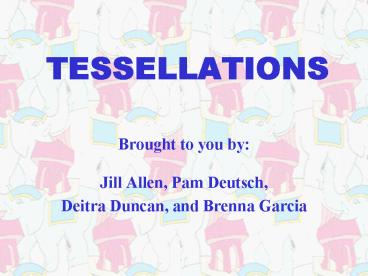TESSELLATIONS - PowerPoint PPT Presentation
1 / 41
Title: TESSELLATIONS
1
TESSELLATIONS
- Brought to you by
- Jill Allen, Pam Deutsch,
- Deitra Duncan, and Brenna Garcia
2
(No Transcript)
3
DefinitionA dictionary will tell you that the
word "tessellate" means to form or arrange small
squares in a checkered or mosaic pattern. The
word "tessellate" is derived from the Ionic
version of the Greek word "tesseres," which in
English means "four." The first tilings were made
from square tiles.
Steven Schwartzman's The Words of Mathematics
(1994, The Mathematical Association of America)
4
A pattern is symmetric if there is at least one
symmetry (rotation, translation, reflection,
glide reflection)that leaves the pattern
unchanged
5
RotationTo rotate an object means to turn it
around. Every rotation has a center and an angle.
6
TranslationTo translate an object means to move
it without rotating or reflecting it. Every
translation has a direction and a distance.
7
ReflectionTo reflect an object means to produce
its mirror image. Every reflection has a mirror
line. A reflection of an "R" is a backwards "R".
8
Glide ReflectionA glide reflection combines a
reflection with a translation along the direction
of the mirror line. Glide reflections are the
only type of symmetry that involve more than one
step.
9
Investigating Tessellations!With Jill
10
We have a shapeThat is really great.Now, lets
seeIf it will tessellate!
11
Why did we get these results?
- Since the regular polygons in a tessellation must
fill the plane at each vertex, the interior angle
must be an exact divisor of 360 degrees. This
works for . . .
12
The triangle . . .
13
The square . . .
14
And the Hexagon.
15
For all the other shapes, the interior angles are
not exact divisors of 360 degrees, and therefore
those figures cannot tile the plane.
16
MANUAL TESSELATIONSwith Brenna
17
Now that youve completed a manual tessellation,
lets see what Geometer Sketchpad can do.
18
The Geometers SketchpadandTessellations
- From instructions written
- by Cathi Sanders
- Punahou School, Honolulu, Hawaii
19
Construct a parallelogram, using parallel line in
the construction menu.
20
Construct a random shape on the left side of the
parallelogram.
21
Select D and then C, and Mark Vector "D-gtC" in
the Transform menu. Then select all of the random
shape and Translate it By Marked Vector using the
Transform menu. (Vector is the name for a segment
with a given length and a given direction.)
22
Construct a second random shape on the top of the
parallelogram.
23
Mark D to A as a vector, and translate the second
random shape.
24
Select the vertices of your polygon in
consecutive order and Construct Polygon Interior
25
Translate the whole polygon (vertices, sides and
interior) by a vector DC and then by a vector DA
to create a tessellation. Use different colors
for adjacent polygons. Drag any point to change
your tessellation.
26
(No Transcript)
27
Try this websitefor a simpler exercise . . .
- http//www.shodor.org/interactivate/
- activities/tessellate/
28
Tessellations arent new. They have been around
for quite some time. Try this website for a
listing of historical and geographical
connections.http//mathforum.org/sum95/suzanne/
historytess.html
29
Chinese tessellation
30
Egyptian tessellation
31
Contemporary artists continue to use
tessellations.
32
A sample tessellation created by famous Dutch
artist M. C. Escher
33
Blue Planet, by Andrew Crompton
34
Seven Birds by Hollister Hop David
A line drawn from wingtip to wingtip has its
middle third cut out by the tailfeathers. The
remaining lines have their middles cut out the
same way. If you were to continue this process
for infinity you would get a set of points known
as The Cantor Set, also known as Cantor Dust. -
This design attempts to suggest infinity. (As
finite creatures, can we do any more than suggest
infinity?)
35
Here are just a few of the samples of student
work that are available for viewing on the
Internet. For a more complete listing of school
websites try . . .http//mathforum.org/alejandre
/students.tess.html
36
In a Rainbow Sea, by Maxine, Punahou High School,
Honolulu, HI I constructed a tessellation using
Geometer's Sketchpad. It looked a bit like a
fish, so I decided to use that theme for my
project, and worked on it a bit to make it look
more fish-like. . . . Tessellations are really
interesting because all the pieces fit together
so perfectly. I like geometry because you can be
really creative with it and make unique projects.
37
Popoki, by Kathleen, Punahou High School,
Honolulu, HI I didn't plan what I was going to
make for my tessellation. I just moved the points
around until I saw something in the figure . . .
This was an easier and faster way to make
tessellations - in other classes we had to draw
them out by hand so it wasn't as much fun, and
you couldn't change them, either. With Sketchpad,
you can change a tessellation and make it be what
you want.
38
Katie Oulton, Ms. Carinos Class Kenston High
School Chagrin Falls, Ohio
39
- Sea World Poem
- I went to the sea,I fell on my kneeand I found
the keyand I drank iced tea.I found a fishand
fried it in a dish.I ate it from the seaand had
it with iced tea. - by Emanuel Castro
- Frisbie Middle School Rialto, California
40
- My Fishy Poem
- I have sixteen fishesBut my cat says they are so
delicious.Now I only have fifteen. - by Humberto Ramirez
- Frisbie Middle School Rialto, California
41
We would like to thank the following websites for
their contributions
- http//mathforum.org/sum95/suzanne/
tess.intro.html - http//mathforum.org/sum95/suzanne/
historytess.html - http//www.shodor.org/interactivate/activities/
tessellate/ - http//www.kenston.k12.oh.us/khs/math/top4.html
- http//www.rialto.k12.ca.us/frisbie/coyote/math/
tess/sea.tess.html - http//mathforum.org/alejandre/
students.tess.html































